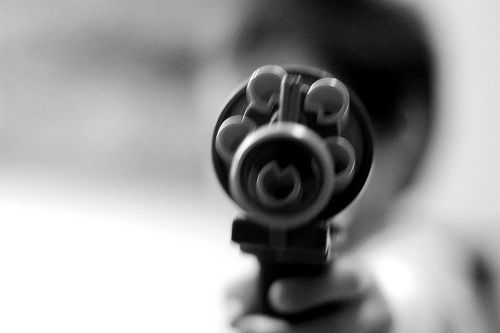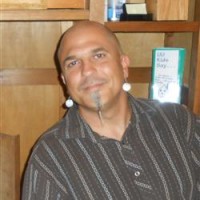The first time I had a gun pointed in my face I was nine years old.
A family member, who was both drunk and high thought it would be funny to point a gun at me—a gun that I thought was loaded, because it always was—and pull the trigger.
When I shook and cried, they pulled the trigger several more times while holding the gun inches from my face. With each pull of the trigger I shook harder, and cried more intensely. After six pulls of the trigger, they put the gun on a table, told me to shut up and that they loved me.
I was so scared that I pissed my pants.
I was happy the gun wasn’t loaded, and so I hugged them and told them I loved them too, then went about my day.
The next time I had a gun pointed in my face was when I was 12 years old.
I was in a drug house that was run by a local group of pharmaceutical entrepreneurs. One of the adult men thought I had stolen something from him, so he pulled out a shotgun and put it to my face. I knew his gun was loaded, and I honestly didn’t feel even the slightest bit of fear.
I didn’t feel anything.
I was hoping he pulled the trigger.
A friend of mine, who was also 12 years old, pointed out to the man that what he thought I stole from him was on the bed. The man picked it up and walked out of the room with his shotgun.
Over the next several years I had many other guns pulled on me. I was shot at.
I know what it’s like to hear a bullet whiz by and then hear the crack of the gunfire afterwards.
Of course, I am grateful I was never killed, but that wasn’t always the case. You see, there wasn’t enough bullets or knives you could put in me, or enough kicks or punches you could hit me with that came close the amount of pain I carried within me.
When all the trauma I experienced came to a head at the age of 12, I was in a constant rage. Like a walking, exposed nerve, I hurt so badly, all I wanted to do was fight, and so I did. I fought in the streets, parties, shopping malls, schools, parks, arcades, wherever and with whomever.
At school the teachers and counselors would talk at me, not with me, and yell at me about my grades and behavior, but there was something they never asked me.
They never asked me about me.
They never asked me about my life outside of school.
They had no idea that the night before I had watched the police and ambulance take away relatives from my home.
They had no idea the night before I had watched a relative overdose.
They had no idea that I had spent the entire weekend in a hospital chapel begging God not to take the life of my relative who was in the ICU.
They had no idea that the night before my cousin committed suicide.
They had no idea that I wasn’t at school for a time because I had attempted suicide.
Know why they had no idea? Because they never asked me about me. No, to the contrary, they let me know that I was going to be dead or in prison before I was 18 years old.
There are no bad kids.
I wasn’t a bad kid, I was a hurt kid.
If we want to help young people who are hurting, yet are unwilling or unable to look beyond the what (behavior) to see the why (hurt), we can be of no service, other than perpetuating a cycle of guilt, blame and condemnation, which a hurting young person is already carrying, not for themselves, but for others who laid that trip on them.
Yes, I fought.
Slowly my fighting moved away from the streets and into dojos, boxing rings and martial arts competitions of many kinds.
The more I fought within the martial arts, the less I fought in the streets.
Then one day I stopped fighting. I was 18 years old and at the Northwest Activity Center in Detroit, MI where I was to have my final match for first place in the Detroit Golden Gloves Tournament. I went in the ring, and simply didn’t have it in me to go after my opponent. I didn’t want to hurt him. I lost that match by points, because I mostly avoided him, and didn’t really try to hit him.
My coaches, who were well known in Detroit for raising some of the best fighters around, were angry and confused. I was confused. I didn’t know what happened to me. I sat in the locker room and cried, not because I lost the fight, but because I had a breakthrough, yet I didn’t have anyone with me to help me process what was going on.
A few months after that fight I was given the opportunity to go to an at-risk youth program that helped participants get into a university if we successfully completed it. I went into the program and completed it successfully because of the mentors in the program.
All of the mentors in that program looked passed the what (our behavior) and clearly saw the why (the hurt we all carried). Not all of us made it through that program, but I know we were all positively affected.
One day in that program one of the mentors and I discussed that moment I had in my last fight. Because I was used to being around so-called manly men, I thought he was going to talk with me about getting back in the ring, being a real man, and all that stuff.
To my pleasant and life-changing surprise, he did the opposite. He said, “Well, it seems like you finally fought the right fight, and defeated the only opponent you’ve ever had.” He patted me on the chest and told me, “All the battles you fought brought you back to what you walked away from when the pain got too deep.”
All those opponents were me.
I was fighting myself the entire time.
I was my only opponent. And through all the sweat, blood, tears and broken bones, the anger slowly dissolved until I got back to what was underneath it—my hurt. In that locker room in Detroit some of my hurt came out, and I felt more free by losing that fight, than I ever had by winning any fight.
Some say that there is no winner in a fight, but I can say that is the only fight I won. By losing that fight I awoke to the futility of fighting. I liked that freedom. I enjoyed that feeling. With the help of some extraordinary mentors, I continued searching for positive ways to release my hurt and experience joy, such as writing, singing, laughing, meditating and sharing the many other ways to take this journey with others.
I am convinced that it didn’t have to take fighting to get back to my heart, and it certainly didn’t have to take years. It could have happened with Yoga, meditation, creative writing, poetry workshops and someone to listen to the why behind the what and work with that.
Yes, I fought, but the fight I lost was my greatest victory.
Love elephant and want to go steady?
Sign up for our (curated) daily and weekly newsletters!
Apprentice Editor: Kim Haas / Editor: Travis May
Photos: Gideon Tsang via Flickr; Courtesy of author.








Read 2 comments and reply